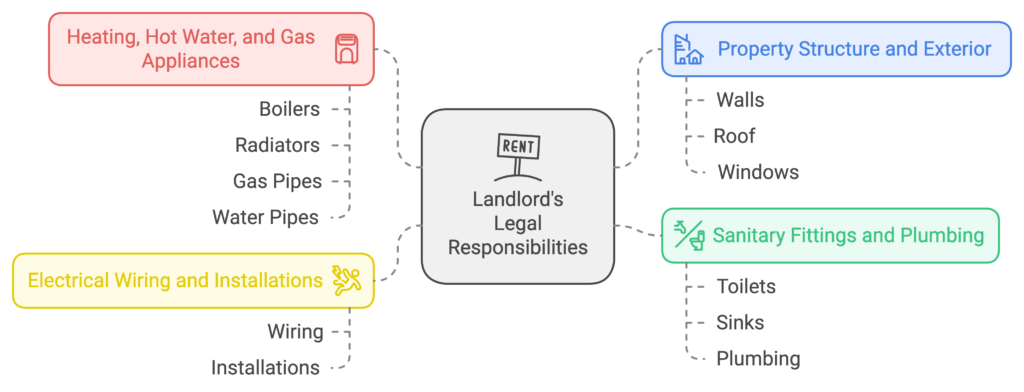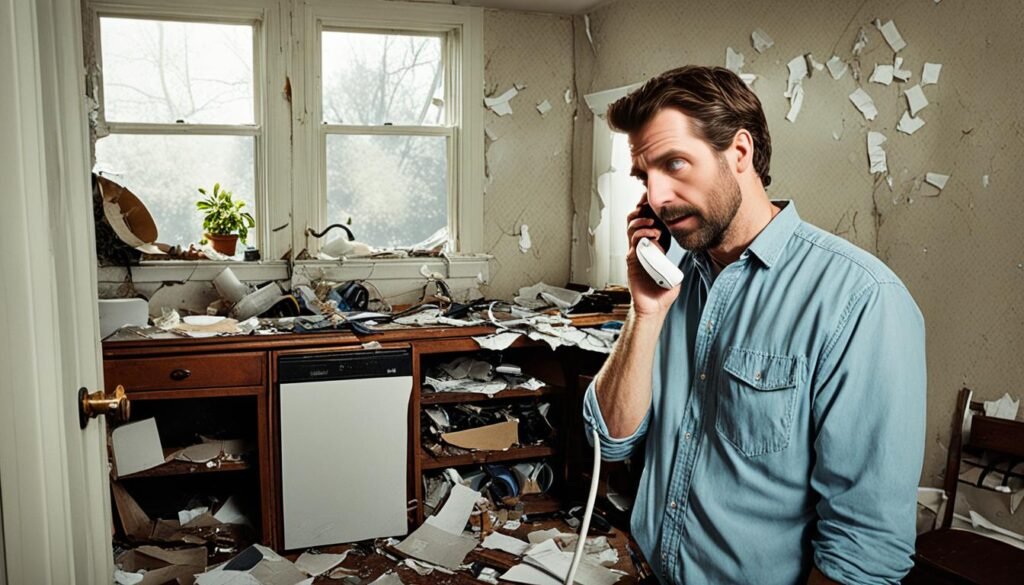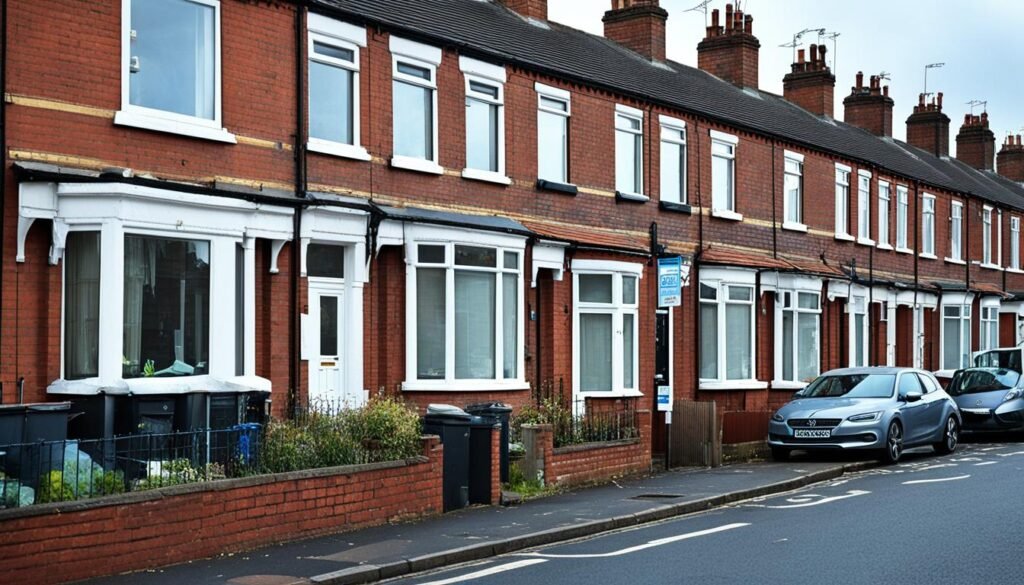Being a residential landlord in the UK means you must think about your legal responsibilities for property repairs. It’s essential to make sure your tenants feel safe and at home. We will look at what UK landlords legally need to fix, and what their tenants have to do. Let’s delve into keeping rental properties in good shape and understanding your duties.
UK landlords are required by law to maintain their rented properties. This includes keeping the structure, exterior, electrical items, and gas appliances in good condition. Your tenants’ home needs to be safe and comfortable. Not meeting these standards can lead to problems with the council and even legal trouble. We will explain the essential maintenance tasks for landlords and what tenants should also help with.
Landlord’s Legal Responsibilities for Repairs
If you’re a landlord in the UK, you must keep the property in good shape for those living there. This means making sure the home is safe and comfortable for your tenants. We’ll look at exactly where landlords need to focus on for repairs.
Property Structure and Exterior
It’s the landlord’s duty to look after the main structure and outside of the home. They should ensure walls, roof, and windows are all in good condition. By keeping these areas maintained, tenants can have a secure and dry place.
Sanitary Fittings and Plumbing
Landlords must also fix and keep up bathrooms and kitchens. This includes toilets, sinks, and the plumbing around them. It’s about making sure water comes in and goes out as it should.
Heating, Hot Water, and Gas Appliances
Landlords need to make sure the home has heating and hot water that work safely. This involves taking care of boilers and radiators, along with gas and water pipes.
Electrical Wiring and Installations
They also have to deal with any electrical problems that pop up. Ensuring the safety of the home’s wiring is part of their job. Tenants can’t be made responsible for this, even if the rental agreement says so.
As a landlord, you can’t get out of these repair duties, no matter what the tenancy agreement says. Making these fixes is essential to provide a livable home for your tenants.

Tenant’s Repair Responsibilities
UK landlords must keep their rental properties in good shape by law. But tenants also have to look after some repairs. If they or their friends cause any damage, they need to fix it. This rule applies to both accidents and on purpose breaks.
Damage Caused by Tenant or Guests
Tenants should care well for their rented home. If they or their visitors break something, it’s their job to repair it. This means fixing walls, windows, or cleaning up any messes.
Repairs Specified in Tenancy Agreement
The tenancy agreementrepair requests uk> lists what repairs tenants should do. They might have to look after the garden or refresh the indoors. Still, if a repair is the landlord’s job, tenants don’t have to do it, even if it’s in the agreement.
While landlords have to make sure homes are safe to live in, tenants play a big part too. They need to take care of their homes. This keeps the place nice and stops it from getting worse.
Reporting Repair Issues to Landlord
Tenants must let the landlord know quickly if any repair issues come up in their home. This fast reporting helps the landlord fix problems before they get worse. It’s also wise for tenants to keep a detailed record of repair reports and any talks with the landlord. Such records are key if problems arise about the landlord’s duties or the home’s condition.
Timely Notification
Alerting the landlord promptly about repairs is crucial. This quick action helps the landlord solve the problem before it gets bigger or damages more. It’s an important job for tenants to report issues early.
Record Keeping
Tenants should keep clear records of all repair reports and any communication with the landlord. This evidence is vital if issues with the landlord’s actions or the property’s state arise. Good record-keeping is essential for tenants to support their rights.

Consequences of Landlord’s Failure to Repair
If a landlord in the UK doesn’t make needed repairs, it can lead to serious issues. The council can step in if they think the problem might hurt the tenant’s health or bother others. The council may force the landlord to fix the problems by law, making sure the house is fit to live in according to set standards.
Legal Recourse Options
Tenants have legal ways to deal with this. They can ask the court to make the landlord do the repairs. Or, they might get money for problems the neglect caused. This is all part of keeping homes in good shape, as the law says.
If the house is really bad, with things like damp or pests, the tenant might even be able to leave the house. But, this is something extreme that has to be decided by the law.
Unfit for Human Habitation
A home might be deemed unfit for people if it has big issues like damp and mould, pests, or dangers to health. The Homes (Fitness for Human Habitation) Act in the UK makes landlords ensure their places are safe to live in. This is true even if the problems weren’t there when the tenant first moved in.
Damp and Mould Issues
Damp and mould are not just unsightly; they can harm your health. This is particularly true for those with breathing problems. Landlords should fix the main causes, like leaks or poor air flow, quickly. If they don’t, the council can step in. They might even issue fines.
Pest Infestations
If there are pests such as rats, bugs, or other critters, the house isn’t safe for people. Landlords have a legal responsibility to sort these problems. It’s part of following the Housing Health and Safety Rating System (HHSRS) rules.
Unsafe Living Conditions
If a place is dangerous due to bad electrics, gas issues, or shaky structure, it’s not fit for humans. In such cases, landlords must act fast. They have to make the home safe under the Homes (Fitness for Human Habitation) Act and the Landlord and Tenant Act.
what repairs are UK residential landlords legally responsible for
UK residential landlords must keep the key parts of the home in good shape. This includes the structure and exterior, sanitary fittings and plumbing, heating and hot water systems, gas appliances, and electrical wiring and installations. They also have to make sure the home is fit for people to live in, fixing issues like damp, pests, and anything dangerous.
They can’t make the tenant do these repairs, even if it’s written in the rental agreement. When tenants spot something broken, they should tell the landlord right away. The landlord has to act quickly to solve the problem. If they don’t, the council might step in, or the tenant might have legal options.
However, tenants also have duties about the house. They must fix any damage they or their guests have done, on purpose or by accident. The rental agreement might add that they need to look after the garden or paint inside, too.
So, UK landlords have to make sure the home is safe and okay to live in. They deal with the big repairs that keep the place running smoothly. Tenants help by reporting any problems quickly. This teamwork ensures the property meets the standards required.
Landlord’s Liabilities: Negligence and Nuisance
Landlords in the UK have important responsibilities for the places they rent out. If they don’t do their part, they could face legal trouble.
This means they have to keep the property in good shape. If they ignore fixing things that are broken, they could be taken to court. This is especially true if a tenant gets hurt or their stuff gets damaged because of these issues.
Negligence in Repair Work
If a tenant tells the landlord about something needing fixing, the landlord has to listen. They should promptly make the necessary repairs to keep everyone safe. If they don’t, and someone gets hurt or loses their things, the landlord might be in trouble.
It’s all about looking out for the people living in the rented homes. Since the law says the landlord has to make sure everything is safe, not fixing problems can lead to legal problems.
Private and Statutory Nuisance
There’s something else called private nuisance, which is about things that disrupt a tenant’s peace. This could be loud noise, vibrations, or bad smells. Landlords need to keep a check on these aspects too.
Then, there’s statutory nuisance which can harm someone’s health or bother the community. If the property’s in a bad state, landlords could get a warning from the local council. This is because everyone has the right to live in a healthy environment.
To stay out of trouble, landlords must work to keep their properties nice. This includes fixing problems fast and making sure tenants are not bothered by things like noise or bad smells. Doing this helps them meet their legal duty to tenants under UK laws.
Defective Premises Act 1972
The Defective Premises Act 1972 says UK landlords must keep rented homes safe. They need to fix any problems that could hurt or damage the tenant, their family, or visitors. This is even if the landlord didn’t know about the issue.
Duty of Care for Personal Injury and Property Damage
Landlords are legally bound to make their properties safe and liveable. They should deal with any defects or hazards that might cause harm. This includes ensuring the safety and habitability of the place.
They can’t just let the tenant handle repairs. Landlords are always responsible for making sure their property is safe for people to live in. They can’t dodge their duty, even if the tenancy agreement says otherwise.
If they neglect their duty, landlords could face serious legal consequences. They might be sued if someone gets hurt or if there’s damage as a result of their negligence. This law is there to protect tenants and their guests.
Houses in Multiple Occupation (HMOs)
Landlords of Houses in Multiple Occupation (HMOs) must follow strict rules. These rules are beyond what’s needed for regular homes. HMOs include houses shared by many people. They need to be extra safe, making sure there’s no danger from fire, gas, or faulty systems.
Additional Safety Requirements
HMOs need to have really good safety in place. This includes fire safety, working gas and electricity, and clean water and drains. The landlords must work harder to keep these places safe and nice for everyone living there.
HMO Licensing
Many HMOs need a special licence from the council. This makes sure they meet certain safety and quality rules. Landlords have to get this licence and follow all its rules. That’s how they can legally rent out their HMOs in the UK.

Safety Standards for Gas, Electricity, and Furnishings
If you’re a landlord in the UK, you need to keep your rental place safe. This means making sure gas, electricity, and furnishings are up to standard. Not meeting these rules could put you in legal trouble and your tenants at risk.
Landlords must get gas appliances checked each year for safety. This check helps find and fix any issues early. They also need to keep the electrical items safe to prevent fires or shocks. If you don’t do this, your tenants could be in danger, and you might face legal trouble.
Also, landlords should give out pieces like sofas and mattresses that won’t easily catch fire. These items must follow specific safety rules. It’s part of the law to keep tenants safe in their homes. If you don’t follow this rule, you could be fined or have your property taken away.
Being a landlord in the UK means you must follow strict rules for safety. Make sure your property is safe for tenants. This keeps you out of trouble and your tenants happy and healthy.




